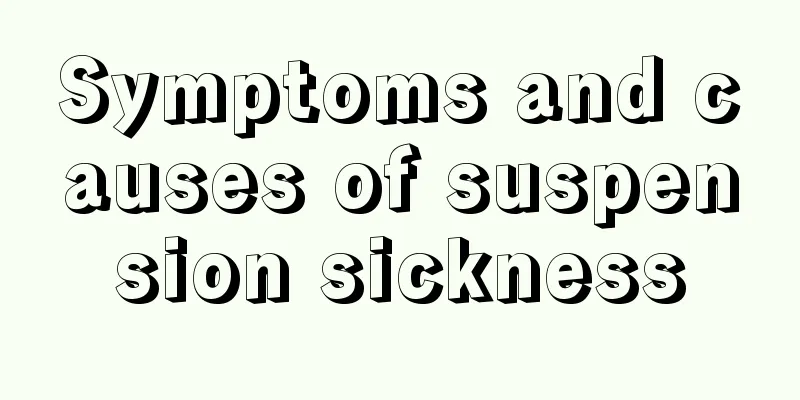Symptoms and causes of suspension sickness

|
In traditional Chinese medicine, vertigo is a phenomenon in which the patient will feel dizzy, nausea, vomiting, and cold sweats all over the body, which will have a great impact on the patient's body. In fact, the cause of vertigo in patients is mainly related to vestibular diseases, which need to be treated through vestibular adjustments. TCM treatment of vertigo Vertigo is characterized by a dizzy feeling during an attack, and even symptoms of autonomic nervous system disorders such as nausea, vomiting, and cold sweats. One thing to note is that vertigo usually reflects a lesion in the vestibular area. It is a symptom, not a disease. There are two main types of vertigo: true vertigo and false vertigo. The harm of vertigo is due to the symptoms. Patients generally experience recurrent episodes of vertigo, accompanied by deafness, tinnitus, and stuffy ears. They may also be accompanied by symptoms such as double hearing, nausea, vomiting, cold sweats, pale complexion, and cold limbs. Causes There are many diseases that cause vestibular lesions. Generally speaking, the following causes can be summarized: Vestibular lesions are located in a complex neuroanatomical area that contains a network of communications from the corticospinal tracts, cerebellum, pons, brainstem, and eighth cranial nerve. Therefore, lesions in this area can be divided into peripheral nerves and central nerves based on the neuroanatomical relationship. Vertigo caused by peripheral neuropathy is often accompanied by tinnitus, hearing loss, and eye tremors in a unique peripheral form. Vertigo due to central nervous system disease, in which the eye tremors present a specific brainstem pattern. The summary is as follows: 1. Peripheral nerve disease 1. Benign paroxysmal vertigo: This type of vertigo is very common in outpatient clinics, and is more common in the elderly. There are often special triggering postures. After a few minutes of attack, if you stop moving, the vertigo will stop, but if the position changes again, the vertigo will occur again. Without any treatment, the symptoms will resolve on their own within six months. Regarding the cause of this disease, the current popular theory is that the otoliths that control balance in the inner ear degenerate and fall off, forming small free particles. When the posture changes, it will affect the flow of endolymph and cause vertigo. Another theory is that a small passage grows from the middle ear to the inner ear, affecting the pressure difference between the left and right sides and causing vertigo. 2. Meniere’s disease: It is still a mysterious disease. Anatomical evidence shows that the main pathological changes of Meniere's disease are unexplained local edema of the endolymph and destruction of the auditory nerve and semicircular canal cells. Patients may experience tinnitus, ear pain, hearing loss, and eye twitching. The attacks are paroxysmal, each lasting from a few minutes to a few hours, and then gradually subside. Over the next few months, the disease will recur at irregular intervals, and with each attack, some hearing loss will occur, until the patient becomes completely deaf. |
<<: Heart beats fast in early pregnancy
>>: What are the symptoms of poor metabolic function
Recommend
How long can you live with acidosis
Acidosis is usually caused by metabolic acidosis ...
How long is the incubation period of bone cancer
How long is the incubation period of bone cancer?...
Is the scent of lily of the valley poisonous?
As people's living standards in modern societ...
Physical methods of cooling down a fever
Fever is something that almost everyone has exper...
Reasons for large and loose calves
Some women have good body proportions and long th...
What to do if your lips are dark in color?
If your lips are dark in color, you should pay at...
Seven tests can help diagnose thyroid cancer
After being diagnosed with thyroid cancer, many p...
How to care for small cell lung cancer
How to care for small cell lung cancer? For patie...
How to clean a burnt casserole
In the cold winter, people like to use casseroles...
Can I wash my face with toothpaste?
Many people are prone to various skin problems, s...
What should I do if my emotions are always unstable?
Some people are always emotionally unstable. Some...
Are peaches diuretic?
Peaches are relatively watery and have certain di...
How to wash your hair with dried Platycladus orientalis leaves
In our lives, many people often lose their hair. ...
How to drink Sterculia lychnophora soaked in water
As we all know, Pangdahai is a very common medici...
What is the metastatic pathway of primary liver cancer
When suffering from liver cancer, cancer cells ar...









